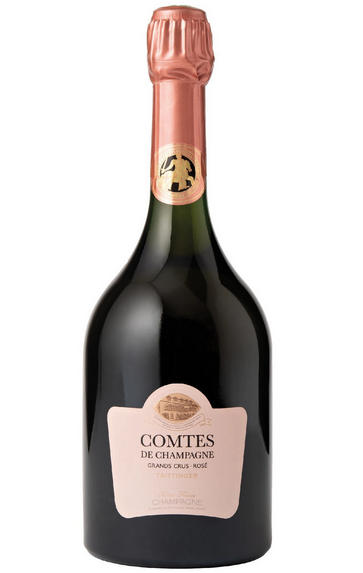
2004 Champagne Taittinger, Comtes de Champagne Rosé, Brut
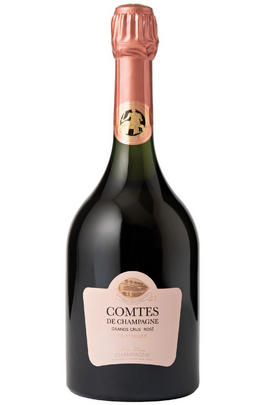
Critics reviews
Champagne Taittinger is one of the oldest Champagne houses as it was founded in 1734 by Forest Fourneaux and acquired by Pierre Taittinger in the 1930's. Remarkably given its fame, the house is still family owned and operated with an equally remarkable 712 acres of vineyards.
This is quite fruity yet solidly complex with scents of red cherry, strawberry and freshly crushed raspberries that are framed by noticeable yeast nuances. There is a clean and very crisp mouth feel to the medium-bodied flavors that deliver very good complexity while being supported with a notably fine mousse. Overall this delicious effort offers plenty of personality and punch plus it is very close to being ready.
Drink from 2014 onward
Allen Meadows, Burghound.com (January 2013)
Taittinger's 2004 Brut Rosé Comtes de Champagne is a delicate, perfumed wine. In 2004 the Rosé shows a quite a bit of Chardonnay character in its precise, chiseled fruit and long, minerally finish. After several hours the wine continued to dazzle with its crystalline purity and fabulous balance. This is a jewel of a wine from Taittinger.
Taittinger is one of Champagne's most consistent large brands. The flagship Comtes de Champagne and Comtes de Champagne Rosé, two of the finest wines in the region, sometimes fly under the radar, but they are both super-pedigreed wines with brilliant track records for developing considerable complexity in bottle. Readers who want to learn more about the estate and Comtes in particular may want to take a look at my article on this site published earlier in the year. Taittinger does so many things well, but it would be great to see the estate add disgorgement dates to its labels.
Drink 2014 - 2034
Antonio Galloni, Vinous.com (December 2010)
Vivid pink. Red berries, orange peel, cinnamon and fresh flowers on the high-pitched nose. Juicy, precise and very pure, offering intense, spice-accented red fruit flavors with hints of exotic spices and candied rose. Aeration brings out notes of cherry and rhubarb, which add depth and a bitter touch to the very long, juicy, fruit-dominated finish. Looks to be built for a graceful evolution but this Champagne is delicious now.
Josh Raynolds, Vinous.com (November 2011)
70% Pinot Noir, 30% Chardonnay (100% from grand cru vineyards). 8 years' ageing on lees before disgorgement. Dosage 10 g/l.
Aroma of Victoria plums and a touch of spice and cedar. Very powerful – the power almost overrides the flavour, but there is also great tension and a fine structure. Bold and needs time.
Julia Harding MW, JancisRobinson.com (July 2014)
Taittinger’s 2004 Brut Comtes de Champagne Rosé is showing brilliantly, bursting from the glass with an expressive bouquet that mingles aromas of rhubarb compote, red plums and spices with notions of dried white flowers, pastry cream and toasted brioche. On the palate, it’s medium to full-bodied, broad and vinous, with impressive depth and chalky structure, succulent acids and a long, precise finish.
While the 2004 Comtes Rosé is drinking beautifully today, it is evolving comparatively slowly by the standards of this classically balanced but somewhat rapidly evolving vintage, and it should offer immense pleasure for the better part of two decades.
Drink 2017 - 2035
William Kelley, Wine Advocate (August 2019)
About this WINE
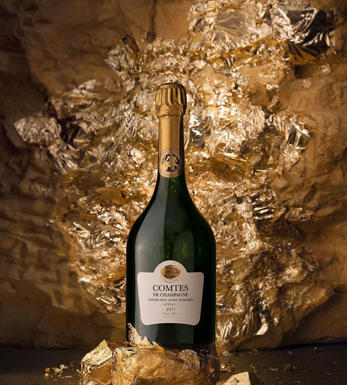
Champagne Taittinger
Taittinger is one of the few family-owned independent Champagne houses in Reims. It produces a very classy Non-Vintage blend and complex Vintage Champagnes as well.
Its top Champagne is Comtes De Champagne - first produced in 1952, it is made from 100% Chardonnay grapes from 6 Grand Cru sites in the Côte de Blancs. This is finely aromatic, rich, creamy Blanc de Blancs at its best, though patience is required as the wine should not be approached for at least ten years.
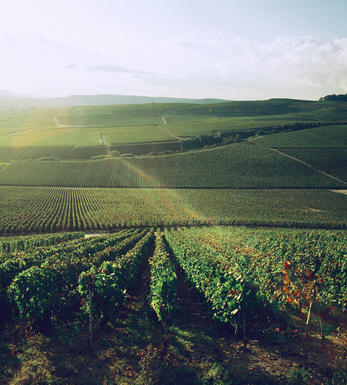
Rosé Champagne
Rosé wines are produced by leaving the juice of red grapes to macerate on their skins for a brief time to extract pigments (natural colourings). However, Rosé Champagne is notable in that it is produced by the addition of a small percentage of red wine – usually Pinot Noir from the village of Bouzy – during blending.
Recommended Producers : Billecart Salmon (Elizabeth Salmon Rose), Ruinart
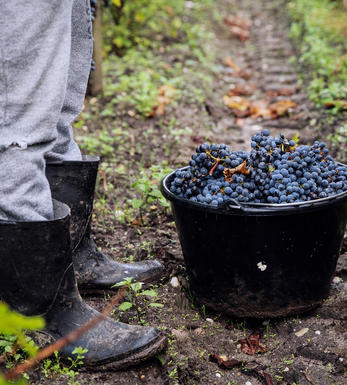
Champagne blend
Which grapes are included in the blend, and their proportion, is one of the key factors determining the style of most Champagnes. Three grapes are used - Pinot Noir, Chardonnay and Pinot Meunier.
26% of vineyards in Champagne are planted with Chardonnay and it performs best on the Côtes des Blancs and on the chalk slopes south of Epernay. It is relatively simple to grow, although it buds early and thus is susceptible to spring frosts. It produces lighter, fresher wines than those from Burgundy and gives finesse, fruit and elegance to the final blend. It is the sole grape in Blancs de Blancs, which are some of the richest long-lived Champagnes produced.
Pinot Noir accounts for nearly 40% of the plantings in Champagne and lies at the heart of most blends - it gives Champagne its body, structure, strength and grip. It is planted across Champagne and particularly so in the southern Aube district.
The final component is Pinot Meunier and this constitutes nearly 35% of the plantings. Its durability and resistance to spring frosts make the Marne Valley, a notorious frost pocket, its natural home. It ripens well in poor years and produces a soft, fruity style of wine that is ideal for blending with the more assertive flavours of Pinot Noir. Producers allege that Pinot Meunier lacks ageing potential, but this does not deter Krug from including around 15% of it in their final blends.


Buying options
Add to wishlist
Description
The 2004 Comtes de Champagne Rosé, Brut shows an expressive nose with notes of strawberries, fresh rhubarb compote, and delicate notes of dried flowers, fresh biscuit and toasted bread. The layered, succulent, textural palate is almost full-bodied with incredible depth and intensity. The linear, firm acidity leads to an elegant, refined finish.
Drink 2023 - 2035
Adrian Brice, Fine Wine Buyer, Berry Bros. & Rudd
wine at a glance
Delivery and quality guarantee